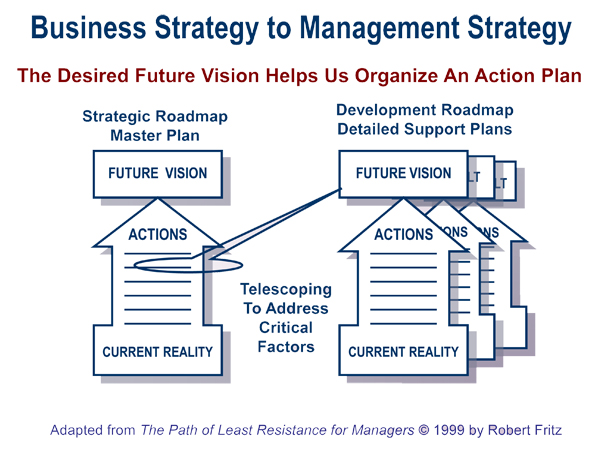Former IBM Chairman Louis V. Gerstner once said that “Strategy is execution.” Effective strategy execution is certainly the desired end of a strategic plan – yet the professional literature shows that up to 75% of change strategies fail:
“Strategies most often fail because they aren’t executed well. Things that are supposed to happen don’t happen” Execution, Larry Bossidy and Ram Charan, 2002
The Strategy execution problem persists. In a Harvard Business Review article entitled “The Secrets to Successful Strategy Execution” (June, 2008) the authors found that 60% of surveyed employees rated their companies weak on strategy execution. The article cited four factors – “decision rights, information, motivators, and structure” – as critical to strategy execution. We believe that one factor – “structural conflict” – underlies all of these strategy execution issues.
How Does Structural Conflict Hurt Strategy Execution?

Strategy Execution is derailed by structural conflict between internal organizations, systems, and actions. Structural conflict produces oscillation rather than strategy execution. In The Path of Least Resistance for Managers Robert Fritz presents the classic conflict between the state of being hungry and the state of dieting. The tension of hunger is resolved by eating and the tension of being overweight is resolved by dieting. These two tension release systems compete. This competition can lead to the oscillation of on again/off again diets. The business world corollary is on again/off again strategy execution.
How Do We Make Strategy Execution Work?
Structural tension must replace structural conflict to clarify strategy execution.
Structural Tension is the difference between our Current Reality and our Future Vision. We can map, telescope out and clarify the “decision rights, information, motivator and organizational structure” required for strategy execution.

Strategy execution requires structural clarity and alignment around purpose and vision. Without that alignment, some people will define their own visions. Strategy execution will be unfocused because some objectives and actions will necessary compete. As we all know, whole organizational “silos” can compete!
Strategy execution necessitates agreement on the baseline terminology of strategy.
See our “Business Strategy Definitions.” Strategy execution is easier when everyone understands the Company Purpose, Vision, Values, Strategy and Objectives the same way.
